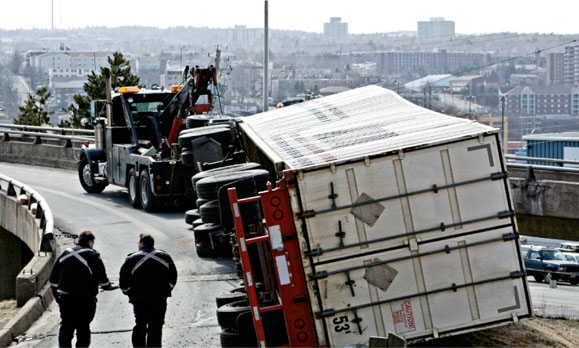 In early March, a tractor-trailer carrying a load of HP laptops smashed through a guardrail, swerved off Highway 401 near Woodstock, Ontario, and plunged into the icy Nith River. Anand Vora, 38, and 37-year-old Jasit Sandhu, the two team drivers tasked with transporting this high-value cargo across the Canadian border from Chicago to Mississauga, didn't make it out alive.
In early March, a tractor-trailer carrying a load of HP laptops smashed through a guardrail, swerved off Highway 401 near Woodstock, Ontario, and plunged into the icy Nith River. Anand Vora, 38, and 37-year-old Jasit Sandhu, the two team drivers tasked with transporting this high-value cargo across the Canadian border from Chicago to Mississauga, didn't make it out alive.
This tragic incident represents one of the most costly types of Motor Truck Cargo (MTC)-related claims insurers see most often, says Helen Leonard, product director for Inland Marine, Americas, at Allianz Global Corporate & Specialty (AGCS) in New York.
After collision, the next-costliest MTC claims are cargo theft and then fire, Leonard says; frequent accident claims involve bad-weather collisions with other trucks, cars and guardrails, and rollovers are common. Collisions of this sort “will make them go right off the road and tip over,” says Leonard.
Recommended For You
Want to continue reading?
Become a Free PropertyCasualty360 Digital Reader
Your access to unlimited PropertyCasualty360 content isn’t changing.
Once you are an ALM digital member, you’ll receive:
- Breaking insurance news and analysis, on-site and via our newsletters and custom alerts
- Weekly Insurance Speak podcast featuring exclusive interviews with industry leaders
- Educational webcasts, white papers, and ebooks from industry thought leaders
- Critical converage of the employee benefits and financial advisory markets on our other ALM sites, BenefitsPRO and ThinkAdvisor
Already have an account? Sign In Now
© 2025 ALM Global, LLC, All Rights Reserved. Request academic re-use from www.copyright.com. All other uses, submit a request to [email protected]. For more information visit Asset & Logo Licensing.








